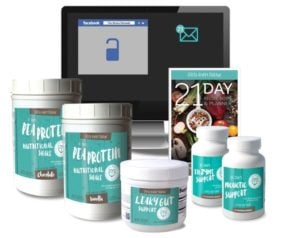
Autoimmune Disease and Leaky Gut: 5 Steps to Breaking the Cycle
- Home
- Autoimmune Diseases
- Autoimmune Disease and Leaky Gut: 5 Steps to Breaking the Cycle

There is a direct connection between autoimmune disease and leaky gut, otherwise known as intestinal permeability: Imbalanced gut bacteria. Dr. Doni gives expert advice on how to break the cycle of imbalance.
Part 3 of Dr. Doni’s Series on Autoimmune Diseases
The connection between autoimmune disease and Leaky Gut, otherwise known as intestinal permeability, is very clear. The common denominator is imbalanced gut bacteria. In this article, we’ll dive into understanding this link and what you can do to begin to heal and rebalance your own gut microbiome.
The Stress-Leaky Gut-Autoimmune Connection
In the last article, I talked about how stress can lead to autoimmune disease. One of the key components of this connection is what stress does in and to the gut.
First, let me explain what I mean by stress. It most certainly includes emotions and the traumatic events that have happened to us throughout our lives. Some examples of very real situations that can cause a stress response are the death of a loved one, getting a divorce, suffering an injury, having financial strain, and surviving an accident or a natural disaster. Intense pressure or strain at work or in relationships and emotional or physical abuse are also sources of intense stress as are childhood traumas left unhealed. All of these situations can cause chronic changes to our stress response system.
Stress to me, however, includes emotional stress and more. I consider anything that triggers stress signals within the body to be stress. For example, our stress response system responds to all of the following: Not getting enough sleep, exposure to pesticides, medications, and/or mold toxins, eating certain foods that trigger an inflammatory response (such as gluten or dairy), and/or consuming too much sugar or alcohol.
The stress response causes the adrenal glands to kick into gear and make cortisol and adrenaline. This is a good thing in a crisis. During times of danger, these responses move energy away from the body systems that have to do with nourishment, repair, and reproduction, such as digestion and estrogen/progesterone production, and into the mechanisms of movement so we can run, hide, and survive.
When stress signals get triggered over and over again, however, these responses do not have a chance to reset, leading to the condition known as “burnout,” which I call “adrenal distress.” In the last article, I talked about how when getting stuck in stress mode most of the time, the levels and also the timing of the stress hormone cortisol can become imbalanced, as can adrenaline levels. This imbalance can throw other things off too, like blood sugar levels, communications to and from the brain, and healthy functioning of the digestive system.
Stress Leads to Intestinal Permeability
Chronic stress, whatever the cause, can lead directly to challenges in the gastrointestinal tract. Two of the major challenges that can develop as a result of stress are leaky gut and imbalance in the gut microbiome. As we shall see, these two conditions go hand in hand in creating an environment that is ripe for one of the dozens of autoimmune diseases to take hold.
Leaky Gut is a digestive system issue that occurs when the cells of the small intestine are not replaced effectively. These cells are actually pretty remarkable, namely because there are a lot of them. In fact, if you laid all of them out side-by-side, they would cover the entire surface area of a regular-sized tennis court. And that is from the small intestinal area of just one person!
During times of stress, the amino acid glutamine, which acts as fuel for these cells, is diverted by the body to help deal with the stress response. This leads to weak or absent intestinal cells and a weak intestinal lining. Over time, microscopic holes in the digestive tract develop. While the holes are tiny, they are big enough to allow undigested food to leak from inside of the intestines out to where the immune system is waiting to protect us from foreign substances. The ensuing inflammation can spread throughout the body. Chronic stress has been linked to leaky gut in many studies. (1)
The fact is that, in this day and age, most people have some level of intestinal permeability going on. According to the National Institutes of Health, roughly 60 to 70 million Americans have some form of “digestive disease,” many of which can be connected to intestinal permeability. (2)
It is not a matter of “if” you have intestinal permeability. It is more a question of “how severe is it?” The more severe, the more you will be sensitive to certain kinds of food, the more inflammation you will have throughout your body, and the more likely that disease conditions such as autoimmune disease will occur.
Stress Leads to Gut Bacteria Imbalance
Stress exposure not only leads to Leaky Gut. It can also disrupt the careful balance of microbes living in the digestive system – from the mouth to the small and large intestines. Having a healthy balance in the gut microbiome means that there is both a diversity of types of bacteria (and other microbes) and enough (not too much and not too few) of each type of microorganism. Having your stress responses constantly “turned on” has been shown to seriously disrupt this balance.
The microbiome consists of trillions of bacteria. This large community of living organisms is reliant on us to feed them with the foods we eat. They thrive on the fibers in fruits, vegetables, nuts, seeds, and grains. In fact, we determine who lives in our gut based on what and how much we choose to, or not to, eat. Fermented foods – such as yogurt, sauerkraut, pickles, and Kimchi – contain bacteria and can add to our gut biome.
Again, it is all about having a healthy balance (i.e. enough, but not too much) of the right bacteria. The bacteria we consider to be “good” are able to make nutrients and neurotransmitters (like GABA) to protect our colon cells and to keep our immune system on track and able to protect us from foreign substances. It actually is possible to have too many good bacteria by over-feeding them. Likewise, you can have an overgrowth of “bad” bacteria by feeding them.
In order to keep a healthy balance of bacteria, these microorganisms rely on the intestinal cells to be healthy and do their job of helping with the digestion and absorption of nutrients. When we don’t digest well (because of stress exposure) and the intestinal cells are damaged, it is much harder for the good gut bacteria to thrive. The bad bacteria end up taking over. This is referred to as “Dysbiosis.” (3)
A Perfect Storm of Perpetuating Imbalances Creates Autoimmunity
When an imbalance occurs in the microbiome, i.e. too few or too many of the right bacteria (and other microbes), too many of the wrong bacteria, or perhaps just the wrong kinds of bacteria in certain areas of the intestines, this increases the likelihood of triggering autoimmunity.
That’s because, in response to this imbalance, the signals to the immune system can shift, causing the immune system to become more inflammatory and start protecting us from our own cells. Autoimmunity can also be triggered by microbiome imbalance because this can encourage the growth of certain bacteria-produced toxins called Lipopolysaccharides (LPS). When certain bacteria overgrow, the level of LPS increases. LPS makes leaky gut worse and is associated with higher inflammation and more autoimmunity. (4)
Why would dysregulation in the gut lead to issues with the immune system? The reason is simple. In the gut is where 80% of our immune system cells are located! The sheer volume of toxins produced by an overgrowth of pathogenic bacteria can begin to overwhelm the immune system as well as the systems of detoxification As a result, the immune system begins to react, sometimes in confused, sporadic, and irrational ways.
For instance, the immune system may begin to attack healthy cells or even food particles and nutrients themselves, destroying or diverting them before they ever have a chance to get to where they are needed in the body. Examples of these reactions include Celiac Disease, where the immune system attacks certain enzymes that are designed to aid in the repairing of the tight junctions in the small intestine. Hashimoto’s thyroiditis is another example. In this case, the immune system attacks and diverts substances needed in the creation of thyroid hormones.
Unfortunately, over time, the cycle of Leaky Gut and autoimmunity can cause even more of a proliferation of imbalanced bacteria and more LPS overall, with heightened autoimmune disease symptoms and oxidative stress damaging cells and mitochondria.
Oxidative stress, and subsequent repair with anti-oxidants, is actually a normal process inside our bodies. When autoimmunity is at play, however, the balance of oxidation and antioxidant activity is disrupted, leading to greater amounts of stress and damage in the body. This, in turn, can cause symptoms of autoimmunity, such as fatigue, brain fog, pain, and weight gain.
At this point, the immune system may also begin to attack other normal tissue, causing additional autoimmune conditions. It is also extremely common to develop more than one autoimmune condition. According to a 2010 Eastern European study, roughly 25% of individuals diagnosed with an autoimmune disease will go on to develop another one. (5)
How Do You Know This is Happening to You?
Some of the ways that your body may be showing you that you may have Leaky Gut, Dysbiosis, and possibly an autoimmune disorder include consistent:
- tiredness and fatigue
- muscle cramps and painful joints
- headaches
- cognitive issues, including brain fog and memory loss
- fertility issues, PMS, and reproductive hormone imbalance
- issues with eyesight (especially glaucoma)
- weight gain (and sometimes excessive weight loss)
- frequent infections, flu, and colds
- mood disorders, including anxiety and depression
- rashes and other skin-related challenges
- bloating, abdominal discomfort, bowel changes
However, keep in mind, it is not necessary to have digestive symptoms. In more than 50% of the cases of leaky gut and dysbiosis, patients do not complain of any discomfort or issues with their digestion.
Whether or not you are experiencing any of the above symptoms, there are ways of determining your likelihood of leaky gut in particular through specialized tests. I find that food sensitivity tests can be especially helpful for identifying leaky gut because when the intestinal cells are leaky, the immune system starts making antibodies toward the foods we consume. These are delayed response antibodies, not IgE immediate response antibodies. That means they cause reactions to foods that can be delayed over days to weeks. This delay makes it difficult to figure out what foods your system may be reacting to.
An IGG / AGA Food Sensitivity panel can show you the foods you are reacting to, as well as the degree of leaky gut. There are many such panels available, but the one I find to be most accurate is what I recommend. I describe why in this article.
You can also do a stool panel to analyze the bacteria and other microbes living in your large intestines. There are many such tests available now, but it’s important to choose a panel that provides clinical information that you can use to benefit your health, not just colorful charts and data that has nothing to do with real-life benefits to your health. Believe me, I’ve reviewed results from different labs for thousands of patients.
The stool panel and food sensitivity panels I recommend are included in both my Leaky Gut and Digestive Solutions Program and in my Autoimmunity Program. Also included in these programs is my expert guidance to interpret and address the results so that you can reverse your health issues.
Turn Off Autoimmunity by Healing the Gut
There is a reason why I focus so intently on rebalancing the gut microbiota and healing leaky gut for anyone I see in my practice that is dealing with an autoimmune condition, as well as those who may be susceptible to autoimmunity. It is because, quite simply, when you heal the gut, you heal the body!
Here are five ways you can begin to do that NOW:
#1 Avoid Reactive Foods
One of the key ways for the small intestinal lining to heal is by keeping inflammation low. And one of the best strategies to do this is to avoid the foods which you are reactive or intolerant. The most common reactive foods are dairy, eggs, and gluten. Gluten is in any bread, pasta, crackers, and pastries made from wheat (white or whole wheat), spelt, rye, and/or barley.
In fact, for the majority of people who have leaky gut and autoimmunity, avoiding gluten is an important first step. It is known to cause leaky gut and inflammation, even if you don’t have Celiac or gluten sensitivity. (6)
#2 Take Digestive Enzymes
Taking digestive enzymes is an important support for digestion and the healthy absorption of key nutrients. Keep in mind that if you are stressed, you will not be able to digest your food properly and have increased leaky gut. Any undigested foods then run the risk of triggering the immune system, causing inflammation, overfeeding bacteria, and kickstarting autoimmunity.
Supplementing with digestive enzymes can give your digestion the support it needs as you work on healing leaky gut and rebalancing your gut bacteria. Research has shown that supplementing with digestive enzymes can help with rebalancing the body during or after periods of heightened stress especially. (7)
#3 Use Nutrients and Herbs to Help Intestinal Cells Recover
In addition, consciously and intentionally including some key nutrients as well as gut-healing herbs in your diet every day can help your intestinal cells and microbiome recover.
Glutamine is the first nutrient I recommend. It is the amino acid that feeds the small intestinal cells and helps your body to grow back a healthy intestinal lining. A high dose is not necessary – even just 500 mg to 2000 mg per day makes a difference. You can get it as a single ingredient in a capsule or powder, or in a combination product with herbs that also help heal the gut lining.
That brings me to deglycyrrhizated herbal licorice (DGL), which is an anti-inflammatory herb known to help heal the intestines (as well as any other inflammation in the body). I prefer it in powder form, but it is also available in capsules. I recommend it in combination with aloe vera, also known as an anti-inflammatory herb, which is extremely healing to digestion.
Fiber is a key substance that is absolutely needed for proper digestive health. Dozens of studies have linked IBS, or Irritable Bowel Syndrome, to lack of fiber in the diet. Some studies have also shown that when fiber is lacking, or over-consumed for that matter, there is a greater rate of SIBO, or Small Intestine Bacterial Overgrowth, as well as dysbiosis in general. Of course, both of these conditions connect back to leaky gut and an overgrowth of LPS. So it’s important to get enough, but not too much, of the best sources of both soluble and insoluble fiber, which come from whole foods.
Another nutrient-rich substance that is absolutely made for healing the gut is bone broth. Studies have found that organic bone broth is able to help with the symptoms of arthritis and other autoimmune conditions affecting the joints and bones. This is because bone broth contains several different kinds of collagen as well as over a dozen different kinds of nutrients, including glutamine, needed for repairing the intestinal lining. (8)
An Italian study conducted in 2015 found that consuming bone broth can significantly lower levels of oxidative stress and inflammation. (9)
Other nutrients and herbs that can help heal leaky gut include N-acetyl glucosamine, minerals, and slippery elm, just to name a few. You can check out more about herbs and substances for healing leaky gut HERE.
#4 Address Overgrowing Bacteria with Bacillus and Anti-Microbial Herbs
While a general probiotic is great for gut health overall, when addressing dysbiosis and autoimmunity, we need to start with a product that has the ability to “direct traffic,” encouraging the bad guys to go and the good guys to stay. That’s why I recommend a Bacillus formula like Megaspore Biotic from Microbiome Labs. Bacillus formulas have the ability to shift the population of the microbiome as well as to support the healing of leaky gut.
It’s important to go slow and gentle, starting with every other day dosages – always with protein to activate the Bacillus. Each week you may increase gradually to daily and eventually to 2 per day for 4 to 8 weeks.
When there is an imbalance of bacteria (shown on stool results), we may also use specific herbs to kill the overgrowing bacteria (or other microbes). These include many common garden herbs that happen to be anti-microbial, such as basil, thyme, oregano, and rosemary. Again, we must go carefully with dosages to prevent “die-off” symptoms, which are caused by the dying bacteria and the toxins they release.
As we determine that your gut biome is improving, you can move on to a mix of Lactobacillus and Bifidobacteria to help maintain your new healthy gut.
#5 Consider Helminthic/Hookworm Therapy
Finally, helminthic therapy is a modality that is gaining popularity. It involves the introduction of very specific types of microbes into your digestion because of their healing capacity. Studies have shown, just like with “good bacteria”, there are “good microbes” that send positive signals to our immune system and help our gut lining to heal. We want those guys working for us. In developed civilizations, however, we don’t get exposed to them, leaving us vulnerable to autoimmunity.
A specific type of hookworm- NA457– is one such microbe. Studies over the past two decades have demonstrated its effectiveness in reversing many autoimmune conditions, including Crohn’s Disease, Celiac, rheumatoid arthritis, M.S., Hashimoto’s, and even autism/ADHD. (10)
NA457 heals through its ability to increase the mucus lining of the intestines and by recalibrating the immune system overall. It can also assist in optimizing the gut biome. I have used helminthic therapy myself for allergies and preventing autoimmunity (which runs in my family) and have found it to be very effective. That is why I feel confident in recommending this therapy to you!
Are You Ready to Heal? Here’s How to Begin
“A journey of a thousand miles begins with one step.”
When it comes to healing from autoimmune disease, sometimes it feels like you are embarking on a “thousand-mile journey!” It can feel overwhelming, but it doesn’t have to. All you need to do is be confident in taking the very next step. For many, that next step is getting the right guidance in order to put together a healing plan that will work best for your unique body.
There are literally thousands of individuals who have been able to live happy, active, productive lives after being diagnosed with an autoimmune condition. They have done this by learning how to work with their body in rebalancing both the immune system and the digestive system.
 They have done it. So can you, and I can help! Being a part of my FREE 7-Day Stress Reset program is a great way to get going. It includes a gluten-free, dairy-free meal plan and initial steps to help you establish a self-care routine that sets you on the path to recovery.
They have done it. So can you, and I can help! Being a part of my FREE 7-Day Stress Reset program is a great way to get going. It includes a gluten-free, dairy-free meal plan and initial steps to help you establish a self-care routine that sets you on the path to recovery.
After the 7-Day I suggest doing my 21-Day Stress Remedy Program. In this program, I guide you in transitioning to a diet that you’ll be able to follow into the future. This is one that supports your body to heal but also allows you to enjoy your food. My goal in the 21-Day Stress Remedy Program is to give you a solid foundation as well as gentle support for putting into place the healthy habits that can take you and your gut health to the next level.
 You can do the 21-Day Stress Remedy Program on your own. You may feel overwhelmed, however, and just want someone to be by your side every step of the way. If you need someone to help you decide which tests to do and to review the results of those tests and if you think you would benefit from having someone who can create an individualized and strategic plan to address the underlying causes of autoimmunity for your body, then consulting with me one-on-one is the ideal choice.
You can do the 21-Day Stress Remedy Program on your own. You may feel overwhelmed, however, and just want someone to be by your side every step of the way. If you need someone to help you decide which tests to do and to review the results of those tests and if you think you would benefit from having someone who can create an individualized and strategic plan to address the underlying causes of autoimmunity for your body, then consulting with me one-on-one is the ideal choice.
Learn about my Autoimmunity Solutions Program here. This program starts with a comprehensive session with me, which you can apply for here.
I want you to be able to live the vibrant life of your dreams. And I’m here to help you to do it.
Whatever path you choose, know that you can do it and that you have a lot of support along the way!
–Dr. Doni
30th June 2021
References:
- ( 1 ) Stress & the gut-brain axis: Regulation by the microbiome
https://www.sciencedirect.com/science/article/pii/S2352289516300509#bib109 - ( 2 ) Digestive Diseases Statistics for the United States
https://www.niddk.nih.gov/health-information/health-statistics/digestive-diseases - ( 3 ) Microbiome and Gut Dysbiosis
https://pubmed.ncbi.nlm.nih.gov/30535609/ - ( 4 ) Lipopolysaccharide-Induced Inflammation
https://www.sciencedirect.com/topics/pharmacology-toxicology-and-pharmaceutical-science/lipopolysaccharide-induced-inflammation - ( 5 ) Multiple autoimmune syndrome
https://www.ncbi.nlm.nih.gov/pmc/articles/PMC3150011/ - ( 6 ) Adverse effects of gluten ingestion and advantages of gluten withdrawal in nonceliac autoimmune disease
https://pubmed.ncbi.nlm.nih.gov/29202198/ - ( 7 ) Probiotics May Help Stressed Gut
https://www.webmd.com/digestive-disorders/news/20060425/probiotics-help-stressed-gut - ( 8 ) Effects of oral administration of type II collagen on rheumatoid arthritis
https://pubmed.ncbi.nlm.nih.gov/8378772/ - ( 9 ) The therapeutic management of gut barrier leaking: the emerging role for mucosal barrier protectors
https://core.ac.uk/reader/188827306 - ( 10 ) Helminth parasites and immune regulation
https://pubmed.ncbi.nlm.nih.gov/30416709/
Share this Post:
Dr. Doni Wilson's Team
14 Day Detox Program
Take the Stress Type Quiz
Dr. Doni Social Media
Popular Posts


The 5 Burnout Types

Healing HPV Holistically: Dr. Doni on the Inspire Health by Jen Podcast

Recent Podcasts
Signup to receive our weekly newsletter with all the latest news, podcasts and special offers
New Book - Order Today!

SIMPLE PRACTICES for SHIFTING FROM YOUR STATE of STRESS to YOUR FLOW and FREEDOM
MASTER YOUR STRESS
RESET YOUR HEALTH
Order Now! Related Posts

What is making you susceptible to HPV?
I have been working with women who had abnormal cells on their cervix and/or vaginally, caused by HPV for over 20 years now. And while

The 5 Burnout Types
Did you know there are 5 burnout types? They are based on your Stress Type®, which is how your adrenal function has been affected by

Healing HPV Holistically: Dr. Doni on the Inspire Health by Jen Podcast
Dr. Doni was interviewed by Jen Ciszewski on the Inspire Health by Jen Podcast, talking about how to heal away HPV from your body for good.

Stress and Trauma: The Science Behind It, How It Shows Up and How to Heal: Dr. Doni on The Burn Fat and FEAST Podcast
Dr. Doni was interviewed by Sarah B. Thomas on the Burn Fat and FEAST Podcast, talking about the impact of stress and trauma on our health and what to do to recover from them.
















